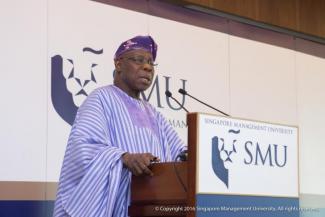
Nigeria, “the giant of Africa” and 7th most populous nation in the world, was the focus of the Presidential Distinguished Lecturer Series on 21 March 2016, when SMU hosted its former President, Mr Olusegun Obasanjo as a speaker. Mr Obasanjo was President of Nigeria between 1999 and 2007, and his term in office was characterised by a commitment to the rule of law, as well as economic and political reform.
“With high oil prices, Mr Obasanjo’s government oversaw a doubling of Nigeria’s average economic growth rate to 6 per cent. Foreign reserves rose from $3.7 billion in 1999 to $45 billion in 2007. Sound economic stewardship helped him secure $18 billion in debt relief from Western creditors and his government used burgeoning state revenues to pay down a further $12 billion in dues leaving Nigeria almost debt free,” observed SMU President Professor Arnoud De Meyer, in his welcome address.
Prof De Meyer added that Mr Obasanjo in 2008 was appointed by the United Nations as a special envoy for Africa and has since overseen democratic elections on behalf of the African Union and the Economic Community of West African States in countries across the continent. “Mr Obasanjo has been a catalyst in driving Africa’s economic transformation. The region is now amongst the fastest growing in the world, rapidly becoming the destination of choice for international investors looking to emerging and frontier markets,” said Prof De Meyer.
Members of the audience included not only SMU students and members of the faculty and staff, but also foreign diplomats, students and academics from other institutions in Singapore, as well as expatriates from Nigeria and other African states who are living and working in Singapore and the wider region. Mr Obasanjo pointed out that he would therefore try to ensure that his lecture included material for those who may not know much about Nigeria as well something for those with a direct knowledge of the dynamic nation.
In a lecture lasting nearly an hour, he outlined Nigeria’s social, political and economic development from colonial times until the present day with an emphasis on its progress since gaining independence from Britain in 1960.
Prof De Meyer then moderated the dialogue session in which members of the audience eagerly posed questions on how Nigeria can foster the next generation of leaders, on countering terrorism in the continent, the legitimacy of various national boundaries in Africa, how expatriates can contribute to Nigeria’s future and what is needed most to further Africa’s economic development.
His answer to the latter question was, “Education and leadership. If your people are educated but there is no leadership, you will not get far. If you have good leadership but your people are not educated and armed with skills, you won’t succeed either.” As proof he cited Singapore as a country that has no natural resources but has progressed due to education and leadership. In summing up, Prof De Meyer welcomed the insight, saying that good education and great leadership are things that SMU strongly believes are key to ensuring a better future for all.

Mr Obasanjo’s lecture attracted a diverse audience from SMU, Singapore and the region.

Mr Obasanjo ensured that his lecture had something to interest those who knew a lot about Nigeria and those who did not.

SMU President Prof Arnoud De Meyer (left) moderated the dialogue between the audience and Mr Obasanjo (right).

One the many audience members who eagerly took the rare opportunity to interact with the former President of Nigeria and United Nations special envoy for Africa.
Watch a video of the lecture here.